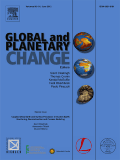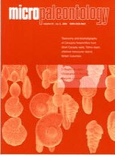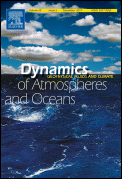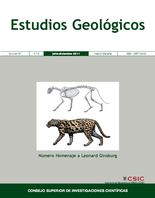
Paleoceanography and Paleoclimatology
metrics 2024
Connecting the Dots of Earth's Climatic History
Introduction
Paleoceanography and Paleoclimatology, published by the American Geophysical Union, is an esteemed open-access journal dedicated to advancing the fields of atmospheric science, paleontology, and oceanography. With an impressive Q1 ranking in all these categories for 2023, the journal is recognized for its impactful contribution, housing research that explores the intricacies of ancient oceanic and climatic systems from 2018 to 2024. Researchers benefit from its robust Scopus rankings, placing it among the top publications in both paleontology and oceanography, with ranks of #5 and #21, respectively, showcasing its significance in the academic community. The journal provides a vital platform for groundbreaking studies that address critical questions regarding Earth's historical climate and ocean processes, making it an essential resource for researchers, professionals, and students alike.
Metrics 2024
 1.59
1.59 3.20
3.20 3.50
3.50 142
142Metrics History
Rank 2024
Scopus
IF (Web Of Science)
JCI (Web Of Science)
Quartile History
Similar Journals

GLOBAL AND PLANETARY CHANGE
Charting the Future of Earth and Planetary ResearchGLOBAL AND PLANETARY CHANGE, published by Elsevier, is a premier international journal focused on the critical issues surrounding environmental science, climate change, and planetary dynamics. Since its inception in 1989, this journal has established itself as a leading voice in the field, currently holding a prestigious Q1 ranking in both Global and Planetary Change and Oceanography as of 2023. With a remarkable influence reflected in its Scopus rankings—15th in Earth and Planetary Sciences and 34th in Global and Planetary Change—it serves as an essential platform for researchers, professionals, and students. The journal provides a comprehensive examination of cutting-edge research findings and innovative developments that address the urgent challenges facing our planet. Although it is not an Open Access journal, it remains a vital resource for anyone keen to contribute to or stay informed on the ever-evolving discourse of global environmental change, promoting sustainable solutions for the future.

MICROPALEONTOLOGY
Bridging Time: From Microfossils to Modern DiscoveriesMICROPALEONTOLOGY is a prominent journal dedicated to advancing the field of paleontology, published by MICRO PRESS. With an ISSN of 0026-2803 and an E-ISSN of 1937-2795, this esteemed publication has been a vital resource since its inception in 1979, continuing to influence the field through 2024. The journal ranks within the Q2 category for Paleontology, highlighting its relevance and quality in the academic community. Notably, it holds a Scopus rank of #41 out of 113 within the Earth and Planetary Sciences field, placing it in the 64th percentile, indicative of its significant impact. Although not an open-access journal, MICROPALEONTOLOGY remains committed to disseminating crucial research findings, making it an essential platform for researchers, professionals, and students dedicated to exploring the intricacies of microfossils and their implications for understanding past environments. With its strategic focus and rigorous peer-review process, this journal plays a critical role in bridging past geological events with contemporary scientific inquiries.

Geologos
Advancing Earth Science Insights for a Global CommunityGeologos is a peer-reviewed journal dedicated to advancing knowledge in the field of Earth and Planetary Sciences. Published by SCIENDO, this Open Access journal has been facilitating unrestricted access to research findings since 2009, ensuring that scholars, professionals, and students can engage with up-to-date scientific discourse without barriers. With an ISSN of 1426-8981 and an E-ISSN of 2080-6574, Geologos is indexed in Scopus, where it currently holds a rank of #111 out of 195 in the General Earth and Planetary Sciences category, reflecting its commendable impact within the discipline. Based in Poland, the journal embraces contributions from international authors, promoting a diverse and inclusive dialogue on topics ranging from geological phenomena to planetary processes. As a Q3 journal in the Earth and Planetary Sciences category, Geologos is committed to enhancing the understanding and appreciation of the Earth's systems, making it an essential resource for those engaged in research and practice within this dynamic field.

DYNAMICS OF ATMOSPHERES AND OCEANS
Fostering Innovation in Atmospheric and Oceanic SciencesDYNAMICS OF ATMOSPHERES AND OCEANS, published by Elsevier, is a renowned journal that has established itself as a vital resource in the fields of atmospheric science, oceanography, and geology. With a rich publication history stretching from 1976 to 2024, this journal provides a platform for high-quality research that addresses the complex interactions between the atmosphere and oceans, which are critical to understanding climate change and environmental systems. It enjoys a respectable impact factor and a reputable position within its category quartiles, specifically noted as Q2 in critical domains such as Computers in Earth Sciences and Oceanography. Researchers and professionals benefit from its indexed coverage, featuring a Scopus ranking that places it among the leading journals in its categories. Although it is not an open-access journal, readers can access its cutting-edge articles through institutional subscriptions or individual purchases. The journal aims to foster cross-disciplinary dialogue and innovation by publishing original research, reviews, and insightful commentary, making it a cornerstone for scholars, students, and practitioners committed to advancing knowledge in the dynamic interplay of Earth's atmospheric and oceanic systems.

Frontiers of Earth Science
Innovating Insights into Our Planet's SystemsFrontiers of Earth Science is a prominent academic journal in the field of Earth and Planetary Sciences, published by Springer. With an ISSN of 2095-0195 and an E-ISSN of 2095-0209, this journal serves as a significant platform for researchers and professionals to disseminate their findings from 2007 to 2024. It is recognized for its impactful contributions within the category of Earth and Planetary Sciences, boasting a respected Q2 ranking in 2023. With a Scopus ranking of 64 out of 195, placing it in the 67th percentile, Frontiers of Earth Science continues to drive academic dialogue and innovation. The journal is dedicated to exploring a diverse range of topics, including geology, meteorology, and environmental science, and amplifying the understanding of Earth systems through rigorous research. Located in New York, USA, this journal embraces an Open Access model, ensuring that groundbreaking research is readily available to the global scientific community, thereby enhancing its accessibility and impact.

ESTUDIOS GEOLOGICOS-MADRID
Bridging Academia and Geology for Global Impact.ESTUDIOS GEOLOGICOS-MADRID is a prominent journal in the field of geology, published by the esteemed Consejo Superior de Investigaciones Científicas (CSIC) in Spain. Established in 1976, this Open Access journal has been a vital resource for researchers and professionals since its inception. With an impact factor reflecting its contribution to the Earth and Planetary Sciences community, ESTUDIOS GEOLOGICOS-MADRID currently holds a Q3 category ranking in Geology as of 2023, showcasing its relevance and quality within the discipline. The journal publishes a diverse array of geological studies, ensuring wide-reaching access to significant research findings, thereby promoting collaboration and knowledge sharing. Established as a platform for both foundational research and applied geology, this journal fosters academic growth and contributes to understanding the Earth’s processes. Researchers, professionals, and students are encouraged to explore its extensive archive, which includes publications from 1976 to the present. For more information, visit the journal's editorial office at Editorial CSIC, C/VITRUVIO 8, 28006 MADRID, SPAIN.

Annual Review of Earth and Planetary Sciences
Synthesizing Insights from Earth to the CosmosAnnual Review of Earth and Planetary Sciences is a leading scholarly journal published by Annual Reviews, dedicated to advancing our understanding of the dynamic processes governing the Earth and its celestial companions. With ISSN 0084-6597 and E-ISSN 1545-4495, this esteemed journal, established in 1976, has consistently provided comprehensive reviews that synthesize cutting-edge research across various disciplines, including astronomy, astrobiology, geology, and planetary science. Notably, the journal has achieved a remarkable position in the academic landscape, ranking in the Q1 quartile across multiple categories, including Astronomy and Astrophysics and Earth and Planetary Sciences, with Scopus rankings placing it at the forefront of these fields. The journal's commitment to facilitating open access to critical scientific advances, though not fully open, allows for maximum reach within the research community. Researchers, professionals, and students alike can benefit from the high-impact articles designed to foster collaboration and innovation within the fields of earth and planetary science.

Spisanie Na B Lgarskoto Geologichesko Druzhestov-Review of the Bulgarian Geological Society
Fostering collaboration in the pursuit of geological excellence.Spisanie Na B Lgarskoto Geologichesko Druzhestov-Review of the Bulgarian Geological Society, published by the BULGARIAN ACADEMY OF SCIENCE, serves as a leading platform for the dissemination of pioneering research and comprehensive reviews in the field of geology. With the ISSN 0007-3938 and E-ISSN 1314-8680, this esteemed journal underlines its commitment to advancing geological sciences, particularly pertinent to the Bulgarian context but with broader implications for global studies. While the journal does not currently offer open access options, its rigorous peer-review process ensures high-quality publications that enrich the geological literature. The journal aims to bridge the gap between theory and empirical research, fostering collaboration among researchers, professionals, and students. With its strategic location in Sofia, Bulgaria, it stands as a vital resource for those keen on exploring the complexities of Earth sciences and contributes significantly to the prestige of the Bulgarian geoscience community.

Ocean Science
Connecting Scholars through Oceanic InsightsOcean Science, published by COPERNICUS GESELLSCHAFT MBH, stands as a premier Open Access journal in the fields of Oceanography and Paleontology, with a commendable impact factor that highlights its influence in the scientific community. Since its inception in 2005, Ocean Science has provided a vital platform for the dissemination of innovative research and discoveries, boasting prestigious rankings of Q1 in both Oceanography and Paleontology categories as of 2023, along with impressive Scopus rankings (7th in Paleontology and 28th in Oceanography). Based in Göttingen, Germany, the journal's commitment to open access ensures that groundbreaking research is readily available to a global audience, fostering knowledge sharing and collaboration among academics, professionals, and students alike. As it converges towards its 20th anniversary in 2024, Ocean Science continues to be an essential resource for those dedicated to advancing our understanding of the marine environment and its geological history.

Science China-Earth Sciences
Unveiling the Planet's Secrets through Cutting-Edge Research.Science China-Earth Sciences, published by SCIENCE PRESS, stands as a leading journal in the field of Earth and Planetary Sciences, currently holding a prestigious Q1 ranking in the 2023 category and positioned at Rank #12 out of 195 in Scopus, reflecting its significance with an impressive 94th percentile. Specializing in a wide array of topics including geological processes, environmental science, and planetary studies, the journal serves as a vital resource for researchers, professionals, and students alike, fostering interdisciplinary collaboration and advanced scientific discourse. With a commitment to accessibility and knowledge dissemination, Science China-Earth Sciences offers an Open Access model, ensuring that high-quality research is available to a global audience. Situated in Beijing, China, this journal is dedicated to promoting innovative scientific advancements and understanding the complexities of our planet from 2010 to 2024 and beyond. As such, it remains essential for anyone engaged in the dynamic and evolving field of Earth sciences.